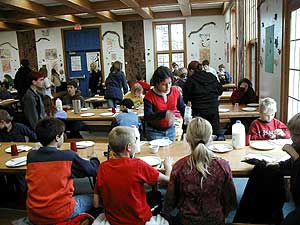|
Audio
Photos
Your Voice
|
Charter schools pose unique challenges in rural Minnesota
December 5, 2003
There are 88 charter schools in Minnesota. About two-thirds of those are in the Twin Cities. But a growing number of charter schools are popping up in greater Minnesota. Supporters say starting charter schools in rural Minnesota is tough. They face resistance from school districts afraid of losing students.
|
Starting a charter school is like being born a wildebeest on the plains of the Serengeti. You've got about 20 minutes to figure out how to run as fast as you can. Otherwise, you're going to get eaten.
- Scott Anderson, Schoolcraft Learning Community director |
Bemidji, Minn. — Just a few years ago, there were no charter schools in Bemidji. Now there are three. The Schoolcraft Learning Community was the first, established in 2000. It serves 160 students in grades K-8.
There are about 100 students on Schoolcraft's waiting list. It offers small class sizes and a hands-on curriculum. It emphasizes the natural sciences, world languages and the arts. Scott Anderson is the school's director. Anderson says the early days of planning the school weren't easy.
"Starting a charter school is like being born a wildebeest on the plains of the Serengeti." said Anderson. "You've got about 20 minutes to figure out how to run as fast as you can. Otherwise, you're going to get eaten."
Charter schools are public schools. But they're run independently of local school districts, often by teachers and parents. When a student moves from a traditional public school to a charter school, about $6,000 in state funding follows the student. Anderson says that creates a dynamic where school districts see charter schools as a threat. He says the relationship is under even more stress in a rural setting.
"There are some kind of cloak and dagger issues that do go on," said Anderson, "and I think a smaller town that's build upon a more traditional established school district is probably going to be less interested in creating a different school environment. It's a little easier to overcome some of those barriers down in the metro area."
 | |||
Creators of charter schools say they face more challenges outside the metro area. Louise Mengelkoch is a professor at Bemidji State University. She was involved in creating two of Bemidji's three charter schools. Mengelkoch says rural communities are more isolated from Twin Cities-based charter school support networks. She says some rural charter schools constantly face resistance from school districts that are used to being the only game in town.
"The administration at schools outstate can kind of get away with more things," said Mengelkoch. "I don't want to say more bullying, but there's no competition in the same sense. I think there are forces outside of us, political forces, that make it an us-against-them situation, when it wouldn't have to be that way. It's like no matter what we do, the only way we can do it right is to not exist. And that's not an option."
Rural administrators, however, say charter schools pose particular challenges to their districts. The Bemidji School District is nearly the size of Rhode Island. It's lost about 300 students to charter schools. That means a loss of nearly $2 million dollars in funding. Bemidji Superintendent Rollie Morud says charter schools in the metro area draw students from many districts.
 | |||
"Whereas a charter school here in northern Minnesota is maybe drawing from two, three or four," Morud said. "And so that impact, it's coming from fewer number of school districts, so it's impact can be greater from that point of view."
Morud says the Bemidji district is learning to adjust to the new charter schools. Still, he and other district administrators will push for some changes when the Legislature meets in February. High on their agenda will be a request to change the funding rate for transportation and special education. By law, districts must provide transportation and special education services to charter schools. Morud says many districts can't afford those extra costs.
"Now it is true that we get some special funding from the state for special education and for transportation, but not enough to cover the cost," Morud said. "Yet we are expected to kick in from our general fund to cover those kinds of things. It's a sense of fairness that's got to be developed into the funding formulas, and it's not there."
Another contentious issue between school districts and charter schools is the availability of extra-curricular activities. Bemidji and a few other districts refuse to allow charter students to participate on their sports teams or other after-school programs. Morud says if charter students want those things, they'll have to come back to traditional public school.
"There are benefits and consequences to the choices that parents make," he said. "And one of the consequences of going to a charter school, is that you can't participate in extra-curricular activities, other than those at the charter school."
Morud says the extra students would mean added costs. But charter school advocates say they're willing to pay their fair share for extra-curricular activities. Steve Dess is executive director of the Minnesota Association of Charter Schools. Dess says it's time to start thinking about what's best for students.
"It's simply being used as almost a weapon against student choice and parent choice in education, said Dess. "We don't need to draw these hard lines when it's public education. We should be creating community here, and waging the war based on the quality of education that the students choose."
The number of charter schools in Minnesota will grow to about 100 by next fall. Charter school advocates expect steady growth of new schools in rural communities. Officials with the Minnesota Association of Charter Schools say they'll lobby lawmakers to ensure state funding dollars continue to follow students who choose charter schools.
|
News Headlines
|
Related Subjects
|

